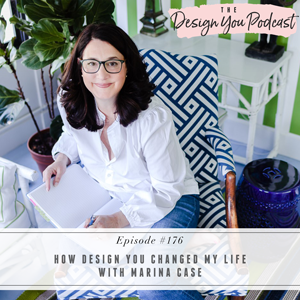
If there’s one thing I love, friends, it’s when people make big, bold moves. And today’s guest absolutely knocked my socks off recently when she pitched me to appear on the podcast! Usually, we approach people and ask them to be on the show, so what a joy it was to have Marina reach out to us! And, of course, the answer was 100% YES.
Marina Case is a hugely successful Interior Designer who has been transforming residential and commercial spaces for more than 20 years. She is the owner of The Red Shutters, an interior design and decorating firm offering packages and options customized to their clients’ needs, and she joins me this week to share how the Design You program changed her life.
Join us this week and hear the incredible shifts Marina has experienced in her life and business, which she attributes significantly to the Design You program. She shares everything she has learned from the program that has helped her business to thrive, and how she is now making three times more money in her business while being the happiest she’s ever been in her life. It’s such an exciting episode, friends, don’t miss it!
If you want help creating a business with thriving revenue streams so that you can design the life you really want this year, now is your chance! The doors to the Design You Coaching Program are officially OPEN! With this round, we are launching a whole new course where I share my complete design system with you. You’ll receive every template, tool, SOP, worksheet, downloadable, video, and more that I have created and used myself, and receive a complete step-by-step for how to run your full-service projects. You do not want to miss this, sign up now!
Don’t forget to come to today’s masterclass about the 3 key lies we keep telling ourselves and the one solution to fix them. Click here to register now, I can’t wait to see you there!





